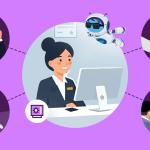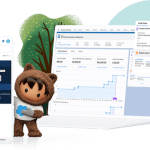Is your hotel chain struggling to meet guest expectations digitally, despite providing luxurious properties? Do you have well-trained staff but still find guest service weighed down by manual processes, delays, and a host of similar operational challenges?
Traditionally, these issues would be addressed by adding new staff, overhauling processes, or introducing yet another point solution. But such approaches can fall short if you don’t first understand what guests really want.
Today’s guests expect more than just a comfortable bed
For years, the quality of hotel service was judged by metrics like ‘room cleanliness’, ‘range of amenities’, and ‘staff friendliness’. But today’s guests expect much more. They want personalised experiences that make them feel understood, valued, and rewarded for their loyalty. In fact, 68% of Asia Pacific (APAC) travellers would increase their hotel spending if offered personalised experiences.
Sometimes, personalisation is about remembering your guest’s dietary restrictions, or ensuring that their favourite beverages are stocked in the minibar. Other times, it’s about offering your guests recommendations for local sightseeing experiences based on their preferences.
Each guest has different needs at different stages of their journey. Corporate guests may prefer faceless service, but leisure travellers may want to be pampered.
These preferences aren’t always captured in a systematic manner. They might be jotted down on paper, or shared verbally with staff; but if they aren’t recorded in a centralised system, they end up getting lost before they can be used to personalise the guest experience.
Converting guests into brand evangelists
Every hotel wants guests that are so happy with their stay that they recommend the property to others. Building this kind of brand advocacy starts by putting guests at the centre of the business. It means understanding their preferences, anticipating what they need during their stay, and making each interaction more engaging.
Many hotels try to do all this the traditional way – i.e., with manual processes and disconnected legacy systems. As a result, personalisation becomes exhausting and difficult to scale.
Other hotels have smart systems in place, but don’t use these tools to enhance the guest experience. So, the potential to delight guests remains untapped.
The best outcomes occur when hotels have intelligent and automated systems that work in sync to make guest experiences feel deeply personalised from start to finish.
How guest-centric are your operations? Use the matrix below to find out.
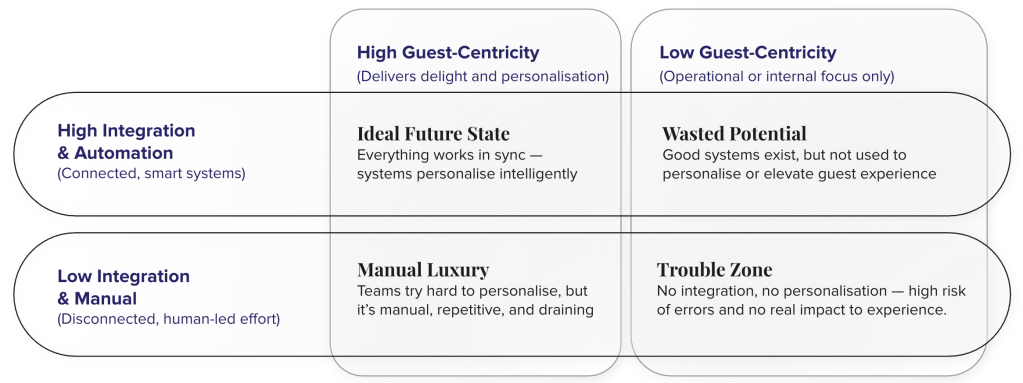
6 steps to delivering exceptional guest experiences
The best guest experiences are built, not stumbled upon by accident. Here’s a roadmap to make them happen:
1) Create a unified and actionable guest view
Hotels often struggle to get a unified view of their guests, despite having robust core software like a property management system (PMS) and enterprise resource planning (ERP) platform.
What helps is an engine that can consolidate guest records into a ‘golden guest identity’. For example, Salesforce Data Cloud connects and harmonises data from multiple sources and systems across the enterprise to provide a 360-degree view of each guest. This data can then be used to trigger customised pre- and post-check-in journeys that help increase conversions.
With a unified guest view, ground staff can efficiently access past reservations, complaints, loyalty vouchers, and interests that enable better guest handling. AI can go even further, creating summaries of guest profiles or notes stored in a PMS – so, staff have a deeper understanding of guest preferences.
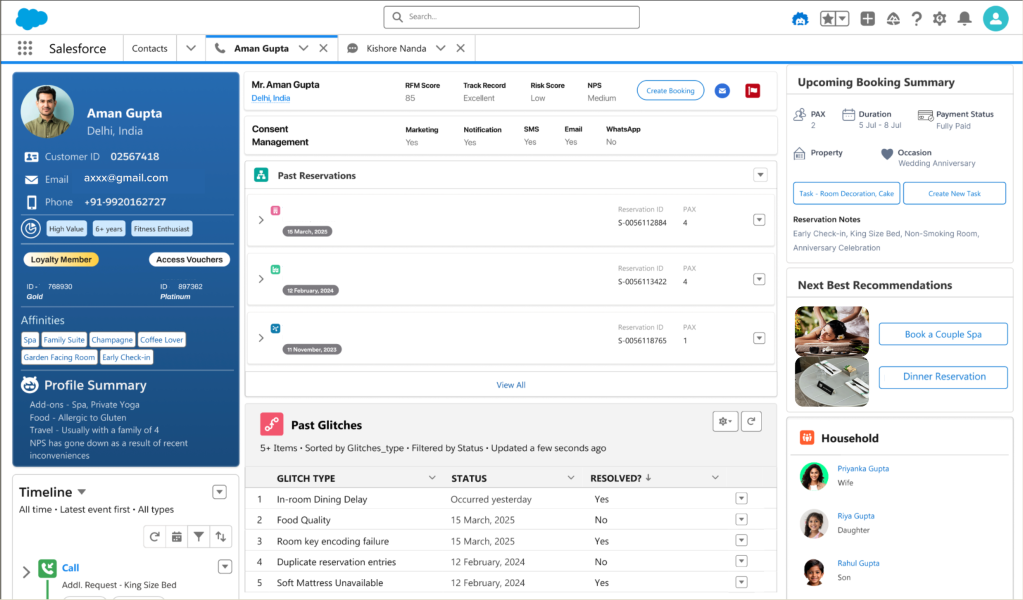
Learn how Wyndham Hotels & Resorts books faster with Data Cloud, increasing revenue per agent.
2) Integrate systems, streamline workflows
Fragmented hotel systems can create a mountain of manual work. Staff end up having to double-check reservation payments, or verify if loyalty points have been properly credited after check-out. These repetitive tasks reduce efficiency.
The solution lies in integrating existing systems – including reservation software, accounting tools, and finance platforms. This way, guest experiences are automated and streamlined from end to end.
An integration layer like MuleSoft goes beyond basic middleware. It can automatically extract information from emails and documents, and record it in the relevant hotel systems. So, staff don’t have to enter that data manually.
When a guest registers for an event, MuleSoft can ensure that their information is automatically updated across all relevant platforms. This results in a seamless check-in at the front desk.
Learn how Holiday Inn Club Vacations Enlists MuleSoft to Make Vacation Booking Quick and Seamless
3) Empower guests
Nobody knows your guests better than themselves. When you empower them with the tools to define their preferences – such as room location, thermostat settings, or even room layout – it becomes easier to personalise their stay.
Guest preferences can be captured during profile creation, reservation, or verbal interactions with hotel staff. CRM platforms like Salesforce store and process guest data in compliance with privacy and security guidelines, while still allowing for data-driven personalised recommendations and nudges.
Agentic AI assistants, like those built on Agentforce, can act as digital concierges for guests. For example, they can automatically schedule taxi pickups, or suggest local sightseeing options. These virtual agents create a truly frictionless guest experience while also boosting staff efficiency. In fact, AI can reduce hotel staff workload by up to 70%. Also, over 80% of hospitality professionals believe AI will significantly reshape pre-booking interactions and guest communications, paving the way for more personalised and seamless connections with travellers.

Learn how Turtle Bay Resort elevates hospitality with AI-driven personalisation.
4) Enable seamless collaboration
The hotel industry thrives on teamwork and collaboration. Platforms like Slack help by connecting staff, conversations, and data in one place – so, work is coordinated smoothly.
Through Slack, ground tasks such as housekeeping requests can be digitised for optimal efficiency. Staff can even summarise guest profiles, and update their preferences using AI on the same tool. Each task can be linked to guest records to provide context and accountability. Task progress can also be tracked to help staff stay coordinated.
But collaboration isn’t just about people. Systems also need to talk to each other. Daily operations, staff attendance, and guest-related tasks necessitate seamless updates across multiple systems. With Salesforce, most frequent activities can be managed on one platform instead of multiple applications.
Crucially, any system handling customer data must prioritise robust security measures that ensure the integrity and confidentiality of sensitive information.
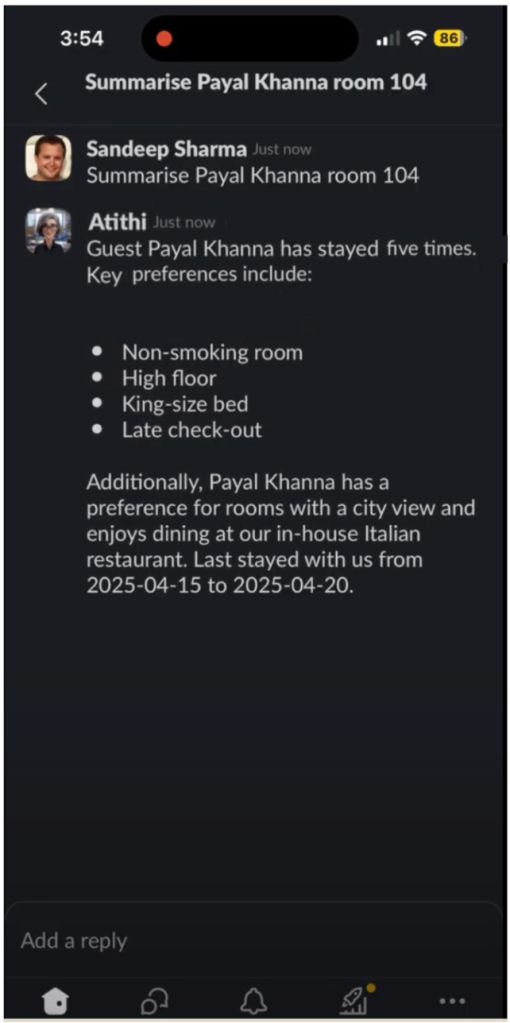
Learn how Engine provides personalised service to 1 million travelers with Agentforce.
5) Augment staff intelligence
To make guest interactions truly meaningful, staff need to be empowered with intelligent insights, AI assistants, and automation.
Centralised guest data can help teams unlock smarter marketing campaigns and analyses. Meanwhile, AI can trigger automated tasks based on reservation notes. For example, if a guest has booked a hotel stay for their birthday, AI can notify staff to arrange for a cake.
Agentic AI can also serve as a personal assistant to employees, addressing SOP queries and policy FAQs – even providing sales insights. For revenue managers, a reporting and analytics platform like Tableau can be useful. It helps track key KPIs such as occupancy rate and budget utilisation. Additional AI-powered insights around growth/de-growth can help managers make better pricing decisions.
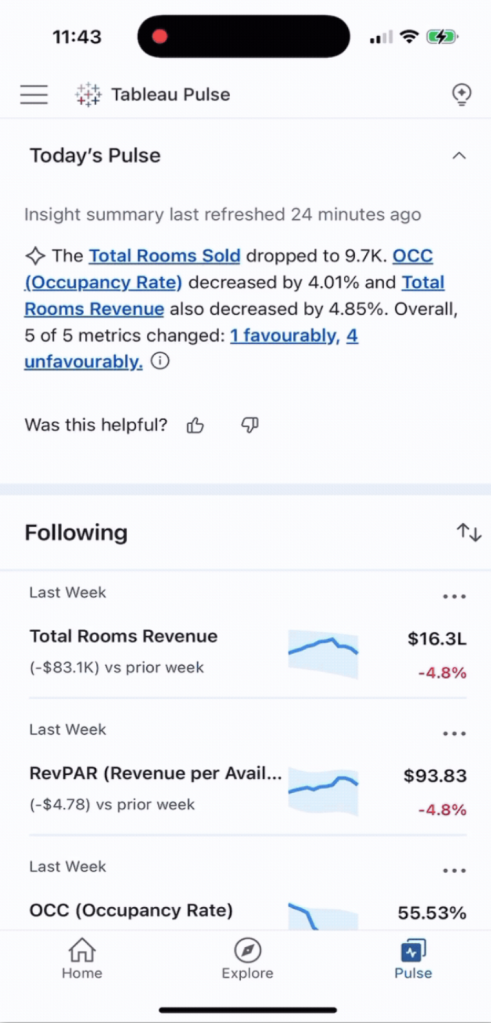
6) Build a connected ecosystem
Hotels don’t operate in isolation. They rely on a network of extended partners such as travel agents, event management companies, and corporate clients. By connecting all these stakeholders in one digital ecosystem, hotels can enable seamless operations and excellent experiences.
Salesforce Experience Cloud provides the building blocks for such ecosystems. Hotels can create a centralised portal for corporate clients to easily manage their bookings, contract utilisation, and pending bills. Similarly, travel agents can have their own portal or app to manage reservations, guest preferences, and voucher details, as well as commissions. Tools like these strengthen trust and engagement with partners.
Exceptional guest and staff experiences will shape the future of hospitality
As the hotel industry continues to evolve, the guest experience will remain front and centre. With streamlined processes and smart technology, hotels can wow guests at every touchpoint, transforming them into brand advocates. Meanwhile, automation can improve the ease of work, fostering stronger employee retention.
Enable your staff to deliver best-in-class hospitality experiences with Salesforce







